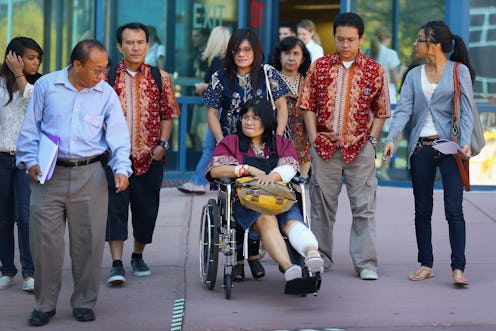News
Colorado Shooting Victims Testify In Court
Survivors of the July 2012 shooting in Aurora, Colorado, have started telling their versions of the horrifying events that took place during the Century Aurora 16 premiere of The Dark Knight Rises. Their stories include gruesome tales of losing friends and loved ones to a sudden hail of bullets. Eye witnesses and victims of the Aurora shooting have started testifying in the state's death penalty case against James Holmes, who is being charged with killing 12 people and injuring 70, according to the Associated Press.
Newlywed Denise Axelrod told the jury that she told her husband she loved him as soon as the bullets rang out, for fear that it would be the last time she spoke to him if they didn't survive, according to CBS News. Axelrod said she and her husband, Brandon, had just returned from their honeymoon and went to the theater with their friend, Joshua Nowlan. Both Brandon and Nowlan were shot, but they survived.
Christina Blache, an Iraq war veteran, attended the movie with her friend Alex Sullivan. She told the AP that she was nervous and anxious to see the man who killed Sullivan and shot her in both of her legs, forcing her to endure years of physical and emotional rehabilitation:
I'd never faced him before. I wanted to see who did it and I wanted to be able to try to look him in the eye. You go through three years of healing and learning, you know, how to walk again and how to swim, how to skate, how to do everything you've learned from the age you were born. All over again. And to look at him ...
In the first month of the trial, prosecutors have called more than 144 witnesses to testify against Holmes, who has pleaded not guilty by reason of insanity. (Prosecutors are arguing that he was sane.) Of those witnesses, 51 were shooting survivors. Many of them hoped that testifying would bring them some form of closure after years of therapy and mourning.
Munirih Gravelly told the AP that she spent months before the trial obsessing over what she might say. When she was finally on the stand, she told the heart-wrenching story of how she huddled between the seats when the gunshots began. Her face was wet, and she thought it was spilled soda. But then when the lights came on, she said she realized it was blood and it wasn't her own. Her friend Jesse Childress was lying next to her facedown, dying. She said she had to step over her friend to get out after people started yelling that they had leave. Despite the fact that she brought her mother to support her during the trial, Gravelly told the AP she felt alone on the stand:
It was a bit of an out-of-body experience.
Most of the victims didn't get to say everything they wanted to — most of them couldn't convey exactly how Holmes' actions had affected their lives because the testimony was controlled by prosecutors and constantly interrupted by objections from defense attorneys. And some of them said they didn't even want to show emotion. Blache offered to be one of the first to testify, she told the AP, to get it out of the way. But she was struggling to compose herself before she got on the stand:
I was shaking because I was trying to hold composure. I didn't want to let him [Holmes] see any kind of emotion, anything he could feed off of.
The victims' testimony was a grave reminder of what the trial was really about — justice for the victims. But would they get it? Or would they feel it just from getting on the stand? For example, when victims are telling they're stories, they aren't allowed to include emotional moments that happened outside of the facts. Louis Duran was describing the moment when blood poured down his face and he thought he was going to die. He said he reached for his phone to call the most important person in his life — his mother — but the description was interrupted by a hearsay objection, according to The Denver Post.
Mai Fernandez, a former prosecutor who is now the executive director of the National Center for Victims of Crime, told the Post that the testimonies have reiterated a sad fact about criminal trials: They are not about the victims. Fernandez told the Post that victims expect something more cathartic than what they actually get at trials:
You think this is your moment in court. But your moment in court isn't really yours. It's the prosecutor's.
Trial attendees like Sandy Phillips are trying to make sure that isn't true in this case. Her daughter, Jessica Ghawi, was killed in the shooting, and Phillips said that "with each description of what row they found a body," the trial was getting more and more difficult. Phillips stayed in the courtroom and cried quietly as Aurora police Officer Aaron Blue described trying to hold Ghawi's airways open as she breathed her last breaths. Phillips told the Post she and her husband, Lonnie, would be around for the duration of the trial to remind people of what it's really about:
You get through the day and you're exhausted. You go home. You try to eat something. You go to bed. And you try to prepare yourself as best you can to go through it the next day. ... We're not going to let anybody forget that it's about the victims and the survivors.
Images: Getty Images (4)
